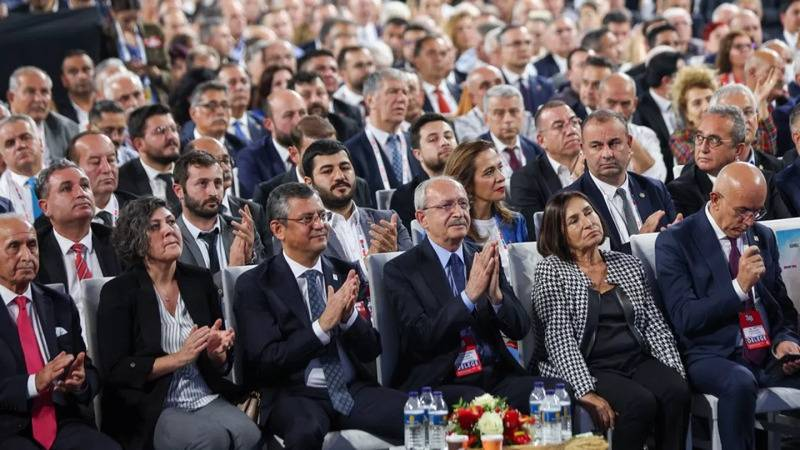Erdogan Pushes for Inquiry Into Prominent CHP Officials
- The Istanbul Chronicle Team
- Jul 21, 2025
- 4 min read
Updated: Jul 25, 2025
Toward the end of June, the Republican People's Party (CHP), already facing the detention of several mayors, bureaucrats, and party officials, was hit with another wave of legal pressure. The political investigation led by Turkish President Recep Tayyip Erdogan has clamped down on party officials, causing them to take new measures against the attempts of intimidation of dissident voices against the central government. The announcement of this operation, just before the 100th day of Istanbul Mayor Ekrem İmamoğlu’s imprisonment, sparked controversy across the political spectrum. The accusations of politically motivated prosecution returning at a time when legal investigations are expanding are of great concern as they point to the erosion of democratic norms and the instrumentalization of the judiciary against dissident actors.

Parliament’s Role in Immunity Lifting Procedures
The publication of debate summaries held in the Grand National Assembly of Türkiye is extremely important in terms of its function in legislative-executive relationships and the functioning of the checks and balances mechanism. The summaries of the notifications forwarded by the Presidency to the Turkish Grand National Assembly on June 23 and July 2, 2025, were submitted to the Joint Committee made up of the Commission on Constitution and Justice. This Committee reviews the summaries of all the proceedings on lifting parliamentary immunity, both in terms of procedure and material, and submits recommendations to the Parliamentary General Assembly. In the investigation summaries brought forward in relation to Özgür Özkan and Tuncay Özkan.Their indictment were prepared due to their social media posts, parliamentary speeches, and press statements were cited as evidence of criminal activity. It was alleged that these statements constituted the crimes of “insulting the president,” “insulting and threatening public officials in connection with their duties,” and “incitement to commit a crime.” The indictment was prepared on the grounds that these statements went beyond political criticism and were subject to prosecution.
The Joint Committee addresses questions to the delegates and receives their oral and written responses. It then makes decisions on the reports prepared by the rapporteurs. Although these decisions are not legally binding, they reflect the general mood of the Parliament and are extremely important in terms of the direction of the political party. The decision of the Committee determines the framework for the voting and shapes the motion request to bring it to the General Assembly. CHP argues that the motions actually serve to "direct political competition through the judiciary" and therefore are "determined by politics rather than the law." There are severe criticisms that this process, grounded on Article 83 of the Constitution, weakens the institution of constitutional immunity.
CHP Officials React Against Investigations
The legal basis for the indictment prepared against Özel is the use of harsh language, such as the term “zibidi” from the 3rd Criminal Chamber of the Court of Cassation. The indictment was prepared within the framework of an investigation initiated ex officio by the Ankara Chief Public Prosecutor's Office on charges of “insulting the president,” “inciting crime,” and “insulting and threatening public officials in connection with their duties”. Expressions such as “coward of God” in Özel's statements have broadened the scope of the charges and paved the way for the second indictment. According to Bianet, the first indictment is related to statements made after the Can Atalay decision and was prepared based on a case filed in the Ankara 13th Heavy Penal Court on charges of “insulting a public official.”
Once the indictments arrived at the Parliament, they were sent to the Joint Commission set up by the Presidency of the Grand National Assembly of Türkiye from the Constitution and Justice Commission in line with the procedure. In this commission, the deputies concerned are listened to, the indictment file is discussed in detail, and a report is prepared for the General Assembly in about a month. When the commission work is finished, the report is put on the General Assembly agenda. At this point, MPs make speeches both supporting and opposing the indictments, and then a vote to lift immunity is held by a simple majority of 151 votes.
Following the warnings, Özel voiced his reaction openly: "They are trying to intimidate us.... I'm the only one who is left, so let them put me in jail." The expression gave focus to the judicial stick, giving a perception of a political operation cobbled together as a legal deadlock. Using his words, "You'll be watching a horror movie," Özel seems to back the view that a fear factor is being set up in the domain of democracy. These statements are intended as a defense for the individual and at the same time become an effort to shape public opinion.
Democracy Backslides as Türkiye’s Image Drowns
These trends all point to a more profound structural danger to Turkish democracy. The undermining of institutional checks and balances by the politicization could be perceived as a party-state rule from the international arena. As opposition leaders are ever more frequently prosecuted for their words, their press releases, or even symbolic speech, the legal system is being transformed into an instrument of political exclusion. Researchers with groups such as Freedom House and Human Rights Watch have cautioned that Türkiye is gradually sliding toward a hybrid authoritarian model, in which electoral processes continue to exist but are emptied of their content by means of legal harassment, media domination, and the repression of dissent. These deployments of Article 299 and anti-terror legislation to go after political speech not only restrict the room for public discussion but also chill democratic engagement. The process not only undermines individual opposition leaders but also poses a threat to the very foundations of political pluralism by suggesting that electoral victory can be negated by judicial decree.
If unchecked, this approach of criminalizing opposition threatens to normalize a political order where power is concentrated in the executive, and the judiciary is an extension of political will instead of an independent branch. The result is the erosion of public confidence in both legal and electoral institutions. Analysts observe that when citizens start to believe that their votes do not equal guaranteed representation, the legitimacy of the democratic process is undermined. As the opposition finds it harder to work within this narrowing space, Türkiye confronts the increasing risk of being a state where the trappings of democracy hide an essentially authoritarian framework. For democratic recovery to be conceivable, guaranteeing judicial independence and constitutional safeguards must become a national imperative, rather than a partisan priority.
İbrahim Aslan
Edited by: Leyla Hacıoğlu


